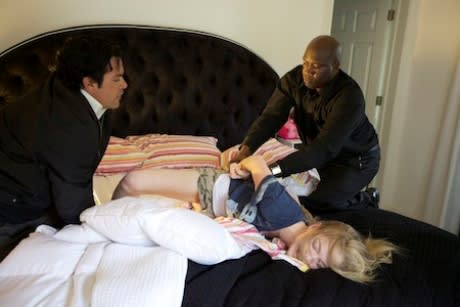Early in Just the Right Amount of Violence, John Bang Carlsen's coyly pious bit of vérité experimentation, there's a scene where interventionists enter the bedroom of a teenage girl and drag her out against her will. Her father stands by in a bathrobe, weirdly taking responsibility for some of their vaguely defined conflicts, verbalizing her need for emotional rehabilitation, yet barely flinching when she accuses him of molestation on camera in front of two complete strangers.
It's an awkward and unlikely moment—the reactions of everyone involved are completely unrealistic—that is exacerbated by experimental camerawork that spins around seeming documentary subjects, capturing emotional breakdowns that would more plausibly happen behind closed doors after the crew had packed up and shipped off.
This disconnect fragments the legitimacy of the film, which asserts, mostly through voiceover and the occasional Skype conversation, the importance (and/or shadiness) of the intervention industry. Since these dramatizations are presented as reality—basically unashamedly lying to a speculative audience—the perceived helpfulness of the process, wherein violent teenagers, often addicted to drugs, are shipped off to a facility in Utah where the laws are somewhat vaguer about the rights of youths, remains unsettling and questionable.
And while this play on reality presentation as a manipulative entity could work as a way of challenging perception, deliberately alienating our tendency to accept information as reliable, Carlsen is more interested in forcing Judeo-Christian ethics down our throats. Religion is only mentioned once in the documentary—a man praising the facility notes that his son shifted from uttering death threats to seeing the beauty of God—yet these inherently patriarchal beliefs are omnipresent.
Carlsen mentions his own upbringing as a lost boy, trying to learn how to be a man without a male role model, which seems to be the problem defining all youth disillusionment. Mother figures are completely irrelevant within the context of this film, while the guiding force of men—morally defined as children of God—is seemingly paramount, reiterating the terrifying solipsistic narrative framework.
It is interesting that the murky outlines and tactics of the youth religious indoctrination camp never seem particularly legitimate, yet Carlsen's decision to avoid ethical questions of treatment in favour of testimonials from the converted suggests the surface verbalizations are to be taken at face value. Had the entire film played with the complex relationship between an unreliable narrator and an audience implicitly forced to trust, Just the Right Amount of Violence could have generated some interesting discourse about the nature of assimilation, whether it be forced onto a problematic child or a question of our tendency to agree to a collective sense of what is "right."
Unfortunately, Carlsen, while outwardly discussing the inherent complexities in trying to make a documentary about a subject that families won't open up about, is preoccupied with his own damaged sense of male bonding and socialization, manipulating the audience with traditionalist views without any real sense of self-awareness.
(Kamoli Films)It's an awkward and unlikely moment—the reactions of everyone involved are completely unrealistic—that is exacerbated by experimental camerawork that spins around seeming documentary subjects, capturing emotional breakdowns that would more plausibly happen behind closed doors after the crew had packed up and shipped off.
This disconnect fragments the legitimacy of the film, which asserts, mostly through voiceover and the occasional Skype conversation, the importance (and/or shadiness) of the intervention industry. Since these dramatizations are presented as reality—basically unashamedly lying to a speculative audience—the perceived helpfulness of the process, wherein violent teenagers, often addicted to drugs, are shipped off to a facility in Utah where the laws are somewhat vaguer about the rights of youths, remains unsettling and questionable.
And while this play on reality presentation as a manipulative entity could work as a way of challenging perception, deliberately alienating our tendency to accept information as reliable, Carlsen is more interested in forcing Judeo-Christian ethics down our throats. Religion is only mentioned once in the documentary—a man praising the facility notes that his son shifted from uttering death threats to seeing the beauty of God—yet these inherently patriarchal beliefs are omnipresent.
Carlsen mentions his own upbringing as a lost boy, trying to learn how to be a man without a male role model, which seems to be the problem defining all youth disillusionment. Mother figures are completely irrelevant within the context of this film, while the guiding force of men—morally defined as children of God—is seemingly paramount, reiterating the terrifying solipsistic narrative framework.
It is interesting that the murky outlines and tactics of the youth religious indoctrination camp never seem particularly legitimate, yet Carlsen's decision to avoid ethical questions of treatment in favour of testimonials from the converted suggests the surface verbalizations are to be taken at face value. Had the entire film played with the complex relationship between an unreliable narrator and an audience implicitly forced to trust, Just the Right Amount of Violence could have generated some interesting discourse about the nature of assimilation, whether it be forced onto a problematic child or a question of our tendency to agree to a collective sense of what is "right."
Unfortunately, Carlsen, while outwardly discussing the inherent complexities in trying to make a documentary about a subject that families won't open up about, is preoccupied with his own damaged sense of male bonding and socialization, manipulating the audience with traditionalist views without any real sense of self-awareness.
